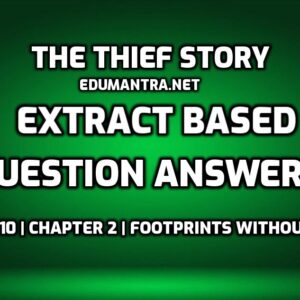
The Thief Story Extract Based Questions are designed by experts. Go through and gain confidence. We at edumantra highly appreciate your feedback regarding The Thief’s Story Extract-Based Questions MCQ.
The Thief Story Extract Based Questions
1.”I hurried back to the room feeling very nervous, for it is much easier to steal something than to return undetected”.
(a) Who is the speaker of this line?
(b) Why was the speaker feeling nervous?
(c) Why was it difficult for the speaker to return the money?
(d) What is the view of Hari regarding theft?
Ans. (a) Han, a young boy is the speaker of this line who is a thief
(b) Because he was keeping back the stolen money and feared to get caught.
(c) He feared to get caught while keeping it back.
(d) It is much easier to steal something than to return undetected.
[pt_view id=”84c41fffme”]
2.”I could come and go as I pleased. He was the most trusting person I had ever met”.
(a) Other than the freedom of moment what else does the speaker feel happy about?
(b) What does the speaker mean by ‘most trusting person’?
(c) Who is the speaker speaking about?
(d) What character traits of the master does this line reveal?
Ans. (a) He was free to come and go when he pleased. Moreover, he was trusted by Anil.
(b) Anil trusted him completely.
(c) Anil, Hari Singh’s master.
(d) Anil is a caring, kind-hearted, compassionate, understanding and trusting person.
3. He took me to his room over the Jumna Sweet Shop and told me I could sleep on the balcony. But the meal I cooked that night must have been terrible because Anil gave it to a stray dog and told me to be oft but I just hung around, smiling in my most appealing way, and he couldn’t help laughing.
(a) What does ‘I’ refer to?
(b) Where did Mil take him?
(c) How did Anil react when Hari cooked a bad meal?
(d) How did Hari respond to his reaction?
Ans. (a) ‘I’ refers to Hari Singh.
(b) Anil took him to the room where he stayed, over Jumna sweet shop.
(c) Anil gave the food to the stray dogs and asked Hari to leave.
(d) Han kept on smiling appealingly.
We hope you are enjoying the The Thief Story Extract Based Questions
4. Well, it’s time I did some real work, I told myself, and I’m out of practice. And if I don’t take the money, he’ll only waste it on his friends. After all, he doesn’t even pay me.
(a) What did he tell himself?
(b) Why did Hari decide to steal?
(c) Does Anil pay Hari a regular salary?
(d) What justification does Hari Singh give for stealing Anil’s money?
Ans. (a) He told himself that whatever he did was correct.
(b) He thought his owner would waste the money M y on his friends and was not paying him his salary. He could use the money for his own use.
(c) No, Anil did not pay n regular salary to Hair.
(d) If he did not steal, Anil would waste the money on his friends. Moreover, he did not pay him any salary so far.
[pt_view id=”6697fa5up0″]